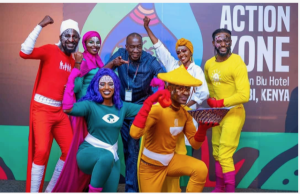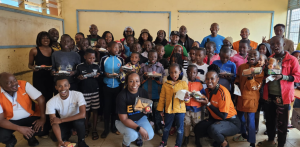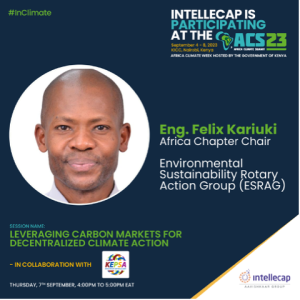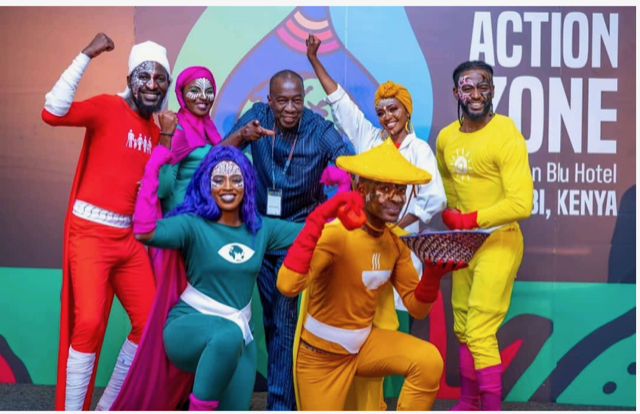By Eng. Felix Kimani Kariuki, ESRAG Africa Chapter Co-Chair
The inaugural Africa Climate Summit 23 was held in Nairobi, Kenya September 4-6, 2023 during the Kenya Climate Week, with the Kenya National Government as the host and the Africa Union as the convener. The theme was Driving Green Growth and Climate Finance Solutions for Africa and the World.
Approximately 30,000 delegates participated. This included 18 Heads of African States, United Nations Secretary-General Antonio Guterres, and European Union President Ursula von der Leyen. Delegates from intergovernmental organizations, regional economic communities, United Nations agencies, the private sector, civil society organizations, indigenous peoples, local communities, farmer organizations, children, youth, women, and academic institutions also came to discuss Africa’s climate change challenges and formulate sustainable solutions.

SDG Superheroes in the Climate Action Zone dramatized the urgency of climate action to save all the other UN development goals.
As co-chair of ESRAG Africa Chapter, I took part in two main side events, Climate Action Zone and the Kenya House Pavilion KEPSA panel on Leveraging Carbon Markets and Tools for Decentralized Climate Action. The Climate Action Zone emphasized the urgency of more action on the UN Sustainable Development Goals, with the deadline to reach them just seven years away.
The carbon market discussions identified legal hurdles, lack of public awareness on the potential of carbon markets, and lack of access to credible registration tools as gaps that need to be addressed. The discussions on decentralized climate action affirmed the importance of engaging the cooperation of farmers, since the continued flow of carbon credit revenue depends on their long-term behavior. Participants also explored ESRAG’s iRotree app potential as a carbon credit tool to document baseline and impact.

Kenyan students were inspired to see the documentary “Kiss the Ground” in a screening and breakfast at school, sponsored by Lavington Eco Rotary Club and the Naivas Supermarket, which sources their groceries directly from farmers.
Top-down financing is prevalent in the world, but the funds are rarely adequate to make a difference because of too many middlemen and corruption. My talk about the Africa Climate Summit for the Nov. 1 ESRAG Projects Seminar outlines the great opportunity for Africa if we connect small farmers so they have the bargaining power to access carbon credit finance more directly. That’s the heart of decentralized climate action. We know how to rebuild the fertility of African soils to restore food security and livelihood and to sequester carbon for the world. We seek to bring in climate finance as new income so local communities thrive.
Watch the talk to learn more about resources for strengthening a bottom-up approach for small farmers including farmers’ cooperatives, satellite monitoring of carbon capture, and agroforestry using regenerative agriculture. I’ve been organizing screenings of the documentary “Kiss the Ground,” which is inspiring and motivating people in communities across Kenya. Tom Lohner of

Felix Kariuki’s talk for the African Climate Summit
the Sustainable Development Fund is also working with ESRAG’s Africa Chapter. The discussion during our November 1 ESRAG webinar identified other resources including the Rotary Community Corps and Rotary’s Memoranda of Understanding with World Vision and USAID.
The Africa Climate Summit culminated in the Nairobi Declaration, an eleven-point call to action proclaiming African States’ unified stance on climate action ahead of the 28th United Nations Climate Change Conference (COP28). The 12-page document:
- Called for full implementation of all COP27 decisions with particular focus on loss and damage and just transition and energy.
- Took note of the 6th Assessment Report (AR6) of the Intergovernmental Panel on Climate Change (IPCC), that the world was not on track to keeping within reach the 1.5°C limit agreed in Paris and that global emissions must be cut by 43% in this decade;
- Underscored the IPCC confirmation that Africa is warming faster than the rest of the world and though not historically responsible for global warming it bore the brunt of its effects, impacting lives, livelihoods and economies.
- Noted that to meet the emission reduction targets outlined in the Paris Agreement, Africa requires a substantial USD 2.8 trillion by 2030.
- Reaffirmed the principles set out in the United Nations Framework Convention on Climate Change (UNFCCC) and the Paris Agreement, namely equity, common but differentiated responsibilities and respective capabilities;
- Further noted that Climate Change resulted in about 400 million people in Africa having no access to clean drinking water and 700 million without good sanitation;
- Expressed that despite Africa having an estimated 40 percent of the world’s renewable energy resources, only $60 billion or two percent of US$3 trillion renewable energy investments in the last decade came to Africa;
- Reiterated Africa’s readiness to create an enabling environment, enact policies and facilitate investments necessary to unlock resources to meet its own climate commitments, and contribute meaningfully to decarbonisation of the global economy;
- Recognised Africa’s vast forests, especially the Congo Basin rainforest as the largest carbon sinks globally, and the important ecosystem services provided by Africa’s vast savannahs, Miombo woodlands, peatlands, mangroves, and coral reefs. It pointed out that it was time that Africa’s natural capital wealth was properly measured with recognition of its contribution to reducing global carbon emissions;
- Called for an honour to the $100 billion commitment in annual climate finance, as promised in 2009 at the UNFCCC COP15 in Copenhagen, Denmark and restructuring of the financial system as African nations often pay up to eight times more for financing from multilateral lending institutions compared to developed countries resulting in recurring debt crises, leaving little or no resources for climate action.
- During the Summit, donor nations and multilateral organizations pledged approximately USD 26 billion for climate investments.
Going into the first Global stocktaking of Cop 28, I seek to showcase the impact Rotary International has had through Rotary’s Environment Area of Focus, and to build effective partnerships to meet the growing knowledge, financial, and technical needs for accelerated climate change adaptation and mitigation.
Felix Kimani Kariuki is a member of the Lavington Eco Rotary Club in Nairobi, Kenya. He is the coordinator of the Government Data Think Tank Initiative (GODAN) Secretariat, business development consultant with AgriBora, and Programmes Director for the Programme for Capacity Development in Africa (P4CDA), working on health, experiential education, agriculture, nutrition, and data sourcing.

Congratulations on your success in drawing attention and garnering support for this effort that effects all of us. I would like to join you in your efforts!!